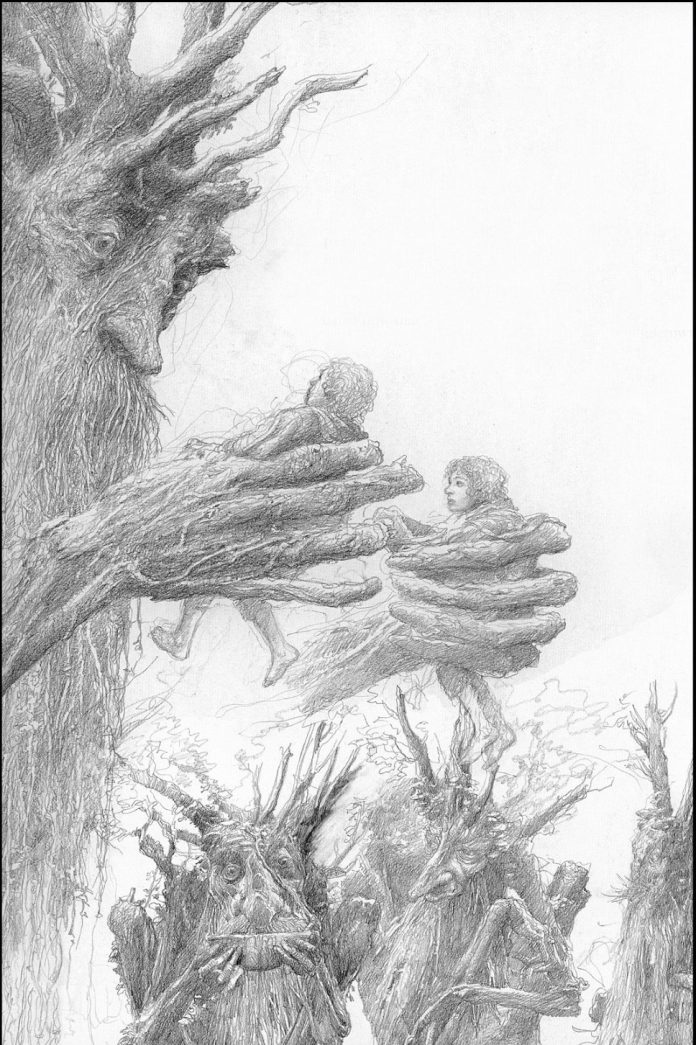Ents or Ent-Folk are living creatures within Middle Earth that date as far back as the First Age, Years of the Trees. They were brought to sentience by Yavanna (Quenya for “Giver of Fruits”), an Aratar. Although, alive and aware Ents were unable to speak until the Elves taught them how.
“Elves began it, of course, waking trees up and teaching them to speak and learning their tree-talk. They always wished to talk to everything, the old Elves did.”
– Treebeard on the life of Ents in the Third Age, The Two Towers, Treebeard
Elvish for singular Ent is “Onod” and the plural for Ents is “Onodrim”.
The Ents are Shepherds of the Trees, a task bestowed upon them by Yavanna. This was due to the deforestation of Middle Earth due to the Dwarves, Orcs, and other perils.
They are described as being 14-foot-tall, humanoid creatures, with thickened skin that resembles thick tree bark. Over the millennia Ents would grow to more closely resemble the species of trees they herded or guarded. Indeed, their personalities would even evolve to resemble their flock.
While immortal, they could still be harmed or killed. Their thick, bark-like skin made metal weapons damaging but slow to be effective. However, as all wooden things are, Ents are very susceptible to fire. They had incredible strength and could do everything earthly trees could do over long periods of time, but at a greatly accelerated rate (think breaking/crushing rocks/boulders that are in their path of growth).
Entish and Ent speech in general is very slow and unhurried, much like the Ent personality itself.
“It is a lovely language, but it takes a very long time saying anything in it, because we do not say anything in it, unless it is worth taking a long time to say, and to listen to.”
– Treebeard on Old Entish, The Two Towers, Treebeard
Ent-Folk includes Ent-Wives and Ent-Maidens, who have been lost for over 3,000 years by the time the events in Tolkien’s The Lord of the Rings transpired.
“’There have been no Entings – no children, you would say, not for a terrible long count of years. You see, we lost the Entwives.’
‘How very sad!’ said Pippin. ‘How was it that they all died?’
‘They did not die!’ said Treebeard. ‘I never said died. We lost them, I said. We lost them and we cannot find them.’ He sighed. ‘I thought most folk knew that. There were songs about the hunt of the Ents for the Entwives sung among Elves and Men from Mirkwood to Gondor. They cannot be quite forgotten.’”
– The Two Towers, Treebeard
Ent’s Reputation
The Ent’s first priority is tending to their trees and saplings and guarding them from harm. Attacking races that wandered too deep into their terrority, which had been reduced to Fangorn Forest by the Third Age. They are known for keeping to themselves and in fact are spoken about as being uncaring about what is happening in the world around them.
When questioned about what side of the war they are on, Treebeard responded:
“I am not altogether on anybody’s side, because nobody is altogether on my side, if you understand me: nobody cares for the woods as I care for them, not even Elves nowadays.”
– The Two Towers, Treebeard
Tolkien’s Inspiration for Ents
As a young schoolboy, J.R.R. Tolkien was frustrated and disenchanted with Shakespeare’s portrayal of Tree People or Ents in MacBeth, whose actors simply held small tree branches to disguise themselves from the enemy when marching to war against Castle Dunsinane. Tolkien vowed to correct the war scene in his future writings and it manifested itself into the Battle of Isengard in The Two Towers, Chapter Flotsam and Jetsam.
Notable Ents
Treebeard (Eldest of the Ents and also known as Fangorn)
Fimbrethil (Treebeard’s Ent-Wife and also known as Wandlimb the lightfoot)
Beechbone (killed during the Battle of Isengard)
Bregalad (also known as, Quickbeam)
Fladrif (also known as Skinbark in Elvish)
Finglas (also known as Leaflock in Elvish)
Trivia
Originally, Tolkien planned to write the Ents as giant trees that were in league with the Enemy. In fact, Ent is Old English for “giant”. However, in the end, Tolkien couldn’t bear to write of nature in this way and while some anger and rage darkened some hearts of Ents, they were far from the majority.







